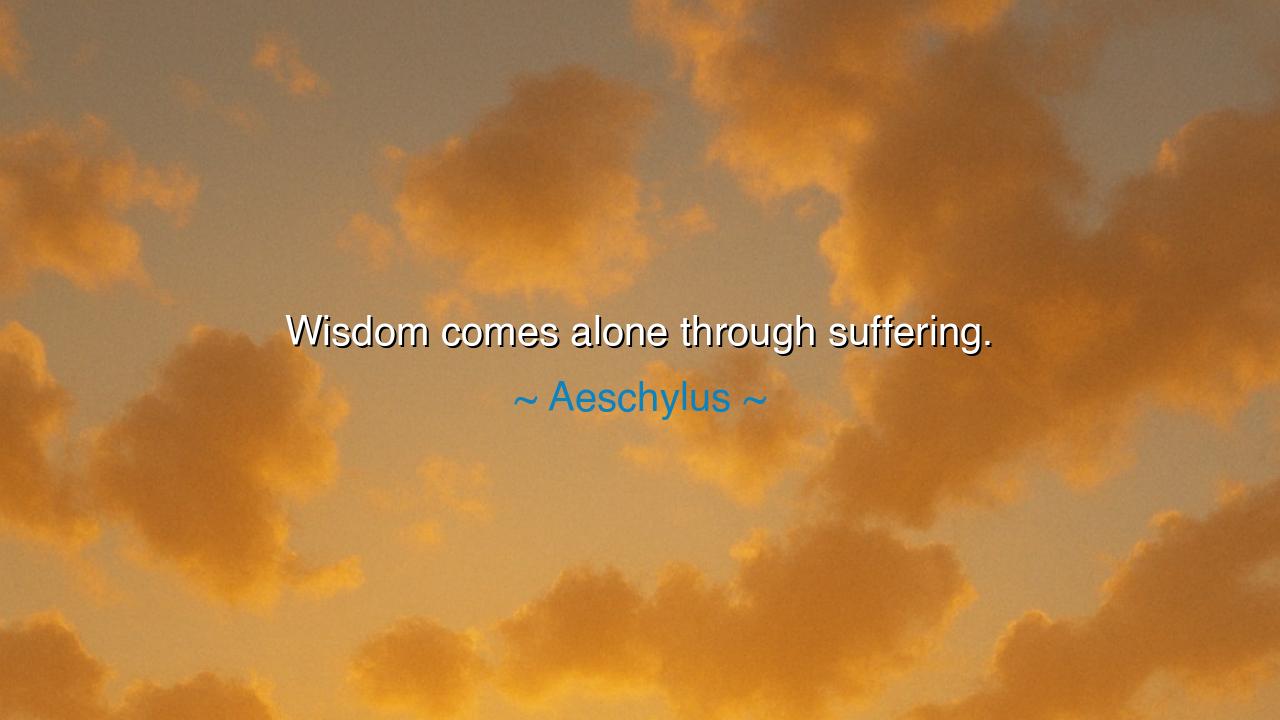
Wisdom comes alone through suffering.






"Wisdom comes alone through suffering." These words, spoken by Aeschylus, the great Greek playwright, carry a truth as ancient as humanity itself: that true wisdom is often forged in the fires of suffering. The road to wisdom is not an easy one, nor is it one that can be gained through comfort or ease. To truly understand the nature of life, its complexities, and its deeper truths, one must endure pain, struggle, and the difficult lessons that come with them. Aeschylus understood, as many philosophers and poets of his time did, that suffering is not a mark of weakness, but the crucible in which the soul is tempered, hardened, and made strong.
In the ancient world, this idea was deeply ingrained in the very fabric of society. The Greeks believed that fate and destiny were powerful forces, often beyond human control. In Aeschylus’s tragedies, such as the Oresteia, we see how the characters' lives were shaped by divine will and the consequences of their actions. Agamemnon, the king, suffers for his past decisions, and his suffering serves as the vehicle through which his son, Orestes, learns the complex and painful truths about justice, revenge, and family duty. It is through this enduring suffering that wisdom is passed down through generations. Aeschylus, like many of his contemporaries, believed that the gods were not merely present in the joys of life but were also entwined in its deepest tragedies.
Consider the story of Odysseus in Homer’s Odyssey. Though he is celebrated as a great hero, it is not his strength in battle or his prowess that marks him as wise. It is his suffering—his ten years of wandering, enduring hardships, and facing immense personal and emotional challenges—that grants him wisdom. Throughout his journey, Odysseus learns profound lessons about patience, humility, and the cost of hubris. His suffering shapes him into a leader who not only understands his own limitations but also learns the importance of loyalty, perseverance, and love. Thus, wisdom comes not just from the victories but from the long, painful road traveled to achieve them.
In the real world, we can look to the life of Nelson Mandela, a man who suffered for his cause but gained immense wisdom through the crucible of prison. Imprisoned for 27 years for his fight against apartheid, Mandela endured physical and emotional suffering that would break most individuals. Yet, this suffering transformed him. It forged a deep wisdom in him—wisdom not born of abstract knowledge, but from living through hardship, learning patience, and understanding the power of forgiveness and unity. When Mandela emerged from prison, he did not seek revenge but sought to build a nation grounded in reconciliation and justice. His suffering had imbued him with the wisdom to heal a nation torn by hatred.
The lesson from Aeschylus's words is one that resonates through history and across cultures: wisdom is not an easily gained commodity. It is born of struggle, reflection, and the ability to endure and learn from hardship. It is the ability to rise again after being knocked down, to see the lessons hidden in pain, and to grow stronger through each challenge. Without suffering, we are often unaware of the depths of our own character, our strength, and our capabilities.
In our own lives, we must not shy away from suffering or difficulties. Instead, we should view them as opportunities for growth. Pain and adversity are inevitable, but how we face them determines the wisdom we gain. Like Odysseus, we must see each trial not as a meaningless misfortune but as a step in the journey toward greater understanding. Just as Mandela emerged from his suffering with the strength to forgive, we too can find wisdom by reflecting on our struggles, learning from them, and using them to shape the future. Let us embrace the trials of life, knowing that through them, wisdom is not just gained—it is earned.
Thus, the message of Aeschylus is clear: suffering, though painful, is the path to true wisdom. When we face challenges, we must ask ourselves: what can we learn from this? How can we grow stronger, wiser, and more compassionate through our struggles? Just as the sword is forged in fire, so too is the soul forged in the crucible of life’s difficulties. Let us not fear suffering, but welcome it as the teacher that leads us to the heights of wisdom and understanding.






AAdministratorAdministrator
Welcome, honored guests. Please leave a comment, we will respond soon